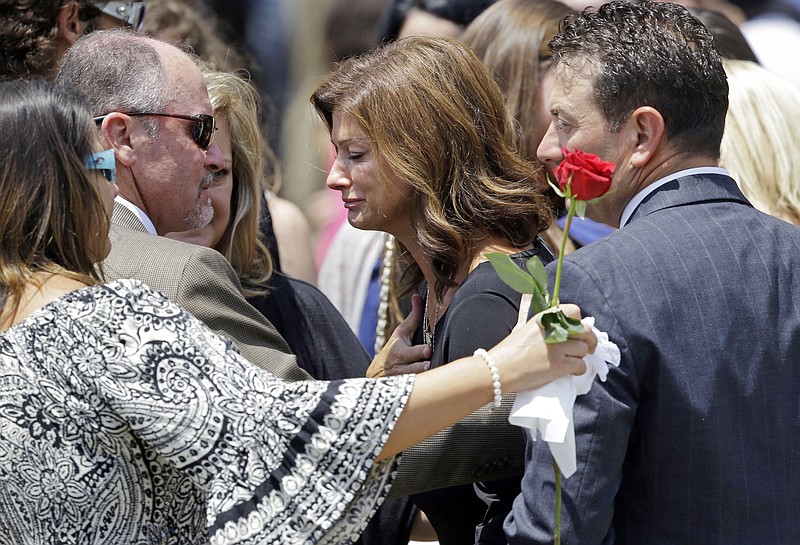CARROLLTON, Ga. (AP) - The gunman responsible for last week's deadly attack in a Louisiana movie theater was delivered by deputies to hospital for a mental evaluation in 2008 after his family said he was a danger to himself and others.
But the judge who ordered him detained said Monday that she did not have him involuntarily committed, which may explain why he was able to legally purchase the gun he used to kill two people and wound nine others before killing himself.
His case underscores the concerns raised in the aftermath of other mass shootings involving suspects with mental health issues - and the gaps in the system meant to "red-flag" people ill-suited to own or carry a firearm.
While an Alabama sheriff said that he denied Houser's application for a concealed weapons' permit in 2006, there appears to have been nothing in court filings that would raise concerns in the FBI background check system.
Contrary to legal filings by Houser's family, Carroll County Probate Judge Betty Cason said she did not order Houser to be involuntarily committed for mental health treatment at the West Central Regional Hospital in Columbus, Georgia, which is in Muscogee County, where she lacks jurisdiction.
Doctors at the hospital would have had to petition that county's probate judge for such a commitment, so "it wouldn't have come through me," Cason told The Associated Press.
This might explain why Houser passed a federal background check in February 2014 allowing him to buy the .40-caliber handgun, despite years of erratic and menacing behavior and run-ins with neighbors, local politicians, and law enforcement officials.
Houser's federal background check came back clean, according to a lawyer for the pawn shop where he bought the weapon, Money Miser Northside Pawn in Phenix City. "We know ATF reviewed our sale and said everything is right on our side," said the store's attorney, Eric B. Funderburk.
"There's a very large haystack of people who have these characteristics, but very few needles that will indeed carry out a rampage," said James Alan Fox, a criminologist at Northeastern University. "They're not red flags. They're yellow. The only time they turn red is after blood is spilled on them."
Cason said she did sign an order on April 22, 2008, authorizing deputies to detain Houser and take him, against his will if necessary, to a treatment facility for a mental health evaluation.
That order would have allowed medical authorities to examine Houser for up to five days. Afterward, doctors would have had to either release Houser, convince him to voluntarily commit himself for treatment, or ask the Muscogee County Probate Court to force him to undergo treatment over a longer period.
It was not immediately clear Monday how Houser's case was resolved, since the probate court records are sealed from public view, and the judges involved said they can't be released.
The case came before Cason's court in 2008 when Houser's family asked her to intervene in Carroll County, where he had allegedly menaced his daughter and in-laws.
While Houser was in the hospital, his family's lawyer, Candace Rader, sought and obtained a protective order from another Carroll County judge after writing -- mistakenly, as it turns out -- that an "Order of Involuntary Commitment" had been issued two days earlier by the probate judge. The AP left messages seeking comment from Rader at her office and on her phone Monday with no immediate response.
Houser suffered from bipolar disorder, showed extremely erratic behavior and had made "ominous as well as disturbing statements" in Carroll County objecting to the pending marriage of his daughter, the family said as they asked for help keeping him away. His wife, Kellie Houser, told police that her husband was not taking his medication and was forgetting to eat, according to a police report.
Muscogee County Probate Court Judge Marc D'Antonio said Monday that privacy laws prevent him from saying whether Houser ever appeared before his court. However, D'Antonio said his office reports all involuntary mental health hospitalizations to Georgia's statewide criminal records system, and those records are eventually fed in a federal database run by the FBI.
"If there had been an adjudication, I am confident we would have reported it," D'Antonio said.
Judge Cason says the case still raises troubling questions about how society cares for the mentally ill.
On one hand, judges are reluctant to take away the civil rights of someone who needs help. She credited Georgia with moving away from a system that effectively warehoused people with mental illness, and now focuses on community care.
"Somebody may be depressed, they may have gone through, lost their jobs of whatever, and they can overcome that. You wouldn't want to earmark that person as somebody who is mentally ill for the rest of their life," she said.
On the other hand, "you have these people that can't basically function, so the question is what do you do?" she said. "I mean, maybe in a controlled environment they could function? But where is that controlled environment? And who is responsible for that controlled environment?"
---
Associated Press Writer Kim Chandler in Phenix City, Alabama, contributed to this report.
